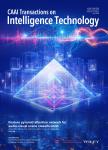版权所有:内蒙古大学图书馆 技术提供:维普资讯• 智图
内蒙古自治区呼和浩特市赛罕区大学西街235号 邮编: 010021

作者机构:Department of Electrical and Computer Engineering and the Social Robotics Lab Smart System Institute (SSI) National University of Singapore Singapore 117576 Singapore
出 版 物:《CAAI Transactions on Intelligence Technology》 (智能技术学报(英文))
年 卷 期:2018年第3卷第1期
页 面:49-58页
核心收录:
学科分类:12[管理学] 1201[管理学-管理科学与工程(可授管理学、工学学位)] 081104[工学-模式识别与智能系统] 08[工学] 0835[工学-软件工程] 0811[工学-控制科学与工程] 0812[工学-计算机科学与技术(可授工学、理学学位)]
摘 要:In this study, the authors present the role playing learning scheme for a mobile robot to navigate socially with its human companion in populated environments. Neural networks (NNs) are constructed to parameterise a stochastic policy that directly maps sensory data collected by the robot to its velocity outputs, while respecting a set of social norms. An efficient simulative learning environment is built with maps and pedestrians trajectories collected from a number of real-world crowd data sets. In each learning iteration, a robot equipped with the NN policy is created virtually in the learning environment to play itself as a companied pedestrian and navigate towards a goal in a socially concomitant manner. Thus, this process is called role playing learning, which is formulated under a reinforcement learning framework. The NN policy is optimised end-to-end using trust region policy optimisation, with consideration of the imperfectness of robot's sensor measurements. Simulative and experimental results are provided to demonstrate the efficacy and superiority of the proposed method.